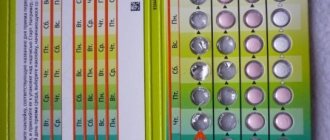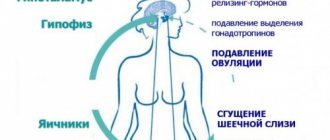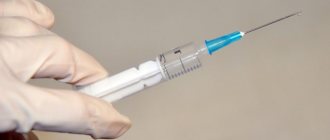How hormonal contraceptives work
Hormonal contraceptives interfere with the activity of the endocrine and reproductive systems. In a healthy woman, the pituitary gland secretes follicle-stimulating hormone (FSH), luteinizing hormone (LH) and prolactin. FSH stimulates the growth of the follicle in which the egg matures, and also causes the ovary to secrete more and more estrogens.
When there is more and more estrogen (mainly estradiol), the pituitary gland responds with a peak release of LH. High levels of estradiol and powerful release of LH trigger the ovulation process.
After ovulation in the second phase of the menstrual cycle, a corpus luteum forms at the site of the follicle. Under the influence of LH and prolactin, it grows and secretes progesterone. During the heyday of the corpus luteum, a second rise in estrogen concentration occurs.
Hormonal contraceptives artificially change hormonal levels. Progestin (a synthetic analogue of progesterone) reduces the release of FSH and LH, which means less estrogens are produced. The pituitary gland reacts to synthetic hormones, its own hormones are no longer needed, and less of them are produced. There is no peak concentration of estradiol and LH, so ovulation does not occur.
Due to a decrease in the amount of one’s own hormones, this condition is compared to menopause. To compensate for the insufficient estrogen content, their synthetic analogue, ethinyl estradiol or estradiol valerate, was included in combined oral contraceptives (COCs).
But, on the other hand, the ovary “rests” from ovulation. It is designed for a small number of ovulations. Previously, pregnancy in women occurred at a young age, followed by breastfeeding (lactation). After a short time - pregnancy and lactation again, and so on until menopause. Therefore, oral contraceptives (OCs) to some extent create relief for the ovaries.
The creation of artificial hormonal levels is also used in the treatment of certain gynecological diseases: endometriosis, uterine fibroids, polycystic ovary syndrome (PCOS), ovarian cysts and others. Some OCs are used in the treatment of acne.
Stopping birth control pills deprives the body of artificial hormones . Gradually, the endocrine and reproductive systems return to natural estrogen production.
All cells of the body are susceptible to sex hormones; they respond to changes in their concentrations. Therefore, some women experience unpleasant symptoms when starting and/or stopping hormonal contraception.
Benefits and indications
Drospirenone, which is part of the drug, prevents the formation of edema, and also has a pronounced antiandrogenic effect, that is, it inhibits many unpleasant symptoms associated with the increased production of male sex hormones.
Taking into account the listed advantages, the drug "Jess Plus" is recommended as a means of contraception for groups of patients with the following disorders:
- fluid retention in the body when using hormonal drugs;
- moderate acne and seborrhea;
- lack of folate;
- severe premenstrual syndrome.
The Jess Plus contraceptive is strictly contraindicated in the following cases:
- hypersensitivity to the components of the hormonal drug;
- thromboembolism and thrombosis, as well as any previous conditions and predisposition;
- diabetes mellitus complicated by vascular disorders;
- any neoplasms, especially those localized in the pelvic area and mammary glands;
- kidney pathologies, including renal failure;
- dysfunction of the liver, gall bladder in severe acute or chronic form;
- migraine accompanied by neurological disorders;
- bleeding from the genital tract of unknown etiology;
- hereditary lactose intolerance.
In addition, the drug should not be used during pregnancy and breastfeeding. If a possible pregnancy is suspected, the prescribed COC should be discontinued immediately.
https://www.youtube.com/watch?v=ytdevru
The components of the tablets significantly impair the taste and nutritional characteristics of breast milk and reduce its production. A small amount of active substances can penetrate into the mammary glands, but at the moment there is no reliable evidence of their harm to the child’s health.
The drug "Jess Plus" should be used with caution in case of high body mass index, high blood pressure, systemic lupus erythematosus, ulcerative colitis and some other diseases that are not absolute contraindications.
Due to the wide list of contraindications, before starting to take a hormonal drug, each patient must undergo an examination to collect a family and hereditary history, including a biochemical blood test, coagulogram or hemostasiogram, cytological examination of the cervix, blood pressure measurement and other examinations as prescribed by the doctor.
During the entire period of use of contraceptives, regular medical examinations should be carried out at least once every 6 months.
Reasons for discontinuing oral contraceptives
Women decide to stop taking contraceptives for various reasons:
- Cancellation of birth control pills at your own request (planning pregnancy, separation from your partner).
- Cancel after a short course to increase the likelihood of getting pregnant.
- A break from hormonal contraception, if it is really necessary and prescribed by a doctor. Otherwise, you will end up with a kind of artificial hormonal imbalance if you take and abandon contraceptives uncontrolled.
- Refusal due to side effects.
- If you are undergoing surgery with prolonged immobilization.
Also, the question of canceling hormonal contraception is relevant for women who smoke over 35 years of age, because the combination of smoking and taking OCs at this age increases the risk of blood clots.
There are dangerous side effects that force a woman to see a doctor and suddenly stop taking hormonal pills. These conditions include:
- Allergic reactions.
- Formation of blood clots (usually venous, but there are also arterial ones).
- Thromboembolism (separation of a blood clot with blockage of a vessel). The story with the drugs Yarina (Yasmin) and Jess (Yas) in 2013 was especially sensational. Bayer was accused of harming the health of several girls and women.
- Liver lesions.
- Pregnancy.
Symptoms that require you to see a doctor:
- Sharp, severe headache.
- Sudden loss of vision, speech, coordination, and sensation in the arms and legs.
- Acute chest pain.
- Breathing disorders.
- Acute pain in the abdomen.
- Sudden pain in the legs, increased local temperature in the leg.
- Significant increase in blood pressure.
- Skin rash, itching, jaundice.
But sometimes a woman decides to stop taking OK because of unpleasant side effects that are not dangerous, but interfere with life. This suggests that this drug is not suitable. Sometimes a woman is never able to choose the optimal OK.
If you develop poorly tolerated and frightening side effects while taking hormonal contraception, you should consult a doctor!
In what cases do women decide to stop taking OCs?
Cancellation of contraceptives usually occurs for the following reasons:
- The family's financial situation improved, and she decided to be happy with the child.
- Your personal life has collapsed, and now you don’t need to protect yourself. Love, at best, is only a dream.
- You are afraid to take hormones for a long time.
- Serious health problems have arisen.
- You decide to switch to another type of contraception
- Despite all precautions, pregnancy occurred
When may it be necessary to urgently stop taking OCs?
With a small amount of hormones, modern contraceptives are well tolerated by the female body. But you should know that if you have serious general diseases, your gynecologist may decide to stop taking the medications and offer you other methods of birth control.
Stopping birth control pills is necessary for the following health problems:
- Liver diseases
- Diabetes mellitus
- Arterial hypertension
- Lipid metabolism disorders
- Varicose veins
- Cancer diseases
- Serious visual impairment
- Intracavitary operations
Are there possible negative consequences when stopping OK?
The results of a study conducted at the departments of obstetrics and gynecology by the medical faculties of several medical universities are interesting.
The abolition of contraceptives sharply increases the activity of the ovaries. This hyperactivity causes many side effects. However, it can also be used for good. Modern OCs can sometimes be prescribed to speed up conception. Since the ovaries begin to work more actively after stopping birth control, this increases the chances of getting pregnant.
As has been established, discontinuation of OCs is accompanied by long-term troubles only if the drug is prescribed incorrectly. The selection of hormonal contraceptives should be made by a gynecologist strictly individually.
What happens in the body when you stop taking birth control?
As a result of stopping the intake of gestagens (progestins) with oral contraceptives, ovulation is disinhibited, and the gonadotropic function of the pituitary gland ceases to be inhibited. The production of follicle-stimulating and luteinizing hormones increases.
How does reproductive function restore?
After stopping taking contraceptives, the following occurs:
- The secretory phase of the cycle (menstrual) is normalized.
- The restoration of temporary atrophic changes in the endometrium begins.
- The ability of the endometrium to implant a fertilized egg is restored.
- The chemistry of the vaginal environment changes.
- The viscosity of mucus (cervical) decreases. Consequently, it becomes easier for the sperm that get here to move.
While these changes are occurring in the body, there is a delay after discontinuation of contraceptives.
What are the consequences of stopping taking contraceptives?
If you were absolutely healthy before and while taking OK, after two, maximum, three months the body will begin to work as before. That is, before you quit birth control and after you did not notice any changes in your health. Healthy women are not in any danger from discontinuing OCs.
In cases where oral contraceptives were prescribed not only for contraception, but also for the treatment of endometriosis, fibroids, amenorrhea, dysfunctional uterine bleeding, etc., stopping the drug may worsen previously untreated diseases. In this case, only your doctor can answer the question of how to stop taking birth control pills. Also, to restore normal functioning of the ovaries, it may be necessary to replace the drug.
For whom is it undesirable to stop using contraceptives?
For a number of women who take oral contraceptives for a long time, their cancellation may be completely undesirable.
This is due to various reasons: age characteristics, the possibility of exacerbation of certain diseases, as well as the type of drug. This natural remedy will 100% relieve pain during menstruation! If you guess what it is, you will get rid of it forever!
Therefore, before abandoning hormonal contraceptives, they should weigh everything carefully and consult their doctor, who will decide whether it is possible to stop taking contraceptives.
So, the following facts must be taken into account:
- Discontinuation of OCs in women with anemia will increase the amount of blood lost during menstruation
- Cancellation of OC reduces the viscosity of mucus, and this increases the risk of inflammatory processes in the pelvic organs
- Stopping OCs during menopause increases the risk of developing osteoporosis.
- Stopping OCs with antiandrogenic properties will increase hair growth on the face and body
- Cancellation of OCs deprives protection against ectopic pregnancy
- Cancellation of OCs may reduce sexual desire, because a woman will have a fear of an unplanned pregnancy
Typical symptoms of withdrawal: cycle failures
After you stop using contraceptives, you may notice some strange things. For example, the cycle may lengthen or, conversely, shorten. Let us remember that a regular cycle lasting from 21 to 36 days is considered normal.
Sometimes there is a delay after stopping birth control for two or three cycles. This time is used by the body to return to its natural mode of operation. Then the cycle becomes regular. If your cycle often went wrong in the past, after you stop taking OK, the disturbances may resume again.
Bleeding
When stopping birth control pills is done, the consequences may manifest in the form of abnormal vaginal bleeding. Moreover, they are unpredictable and can start at the most inopportune moment.
To prevent such drastic reactions, you can stop taking birth control pills only after waiting for your period. Those. The package must be drunk completely.
If your stomach hurts after stopping birth control
If the ovaries are too active, there may be pain in the lower abdomen after stopping birth control. They should go quickly. If the pain persists for a long time, you should consult a gynecologist. Its causes may be hypothermia or sexually transmitted infection, improper bowel function.
Other manifestations
If contraceptives are discontinued, the consequences almost always appear. After a long-term rest, a woman’s ovaries work more actively for several months than before taking OK. This temporary change in hormonal levels causes discomfort, which manifests itself differently in each woman.
Stopping birth control pills side effects:
- Depression
- Skin rashes
- Delays
- Increased menstruation
- Malaise
- Increased irritability
- The work of the sweat and sebaceous glands is enhanced again
- The appearance of comedones (blackheads on the face), acne
- Sometimes, pain in the lower abdomen
- Headache
- Nausea
- Loss of sexual desire
If the consequences of stopping birth control do not go away for more than six months, and the symptoms listed above interfere with your life, you should consult a gynecologist.
Is it really that dangerous?
If hormonal contraceptives are discontinued, the consequences are inevitable. Should you fear for your health if your body reacts quite sharply to stopping oral contraception? As such, this does not pose a serious threat to health and only causes a number of troubles.
Contraceptive withdrawal syndrome is the body's normal reaction to stopping the supply of a drug. Such conditions also occur when you stop taking many other conventional medications. For example, after stopping taking antihypertensive drugs, which helped maintain normal blood pressure for a long time, the pressure increases, when antianginal drugs are stopped, angina increases, etc.
Also read: Upper third of the cervical canal
Anything that happens after stopping birth control will go away if you start taking the OC again after 2-3 months. If you do not plan to take them again or the withdrawal syndrome from birth control pills lasts too long, your gynecologist will prescribe you suitable drugs or hormone-correcting agents.
When is the best time to get pregnant after stopping OC?
Normal ovulation after discontinuation of contraceptives is established after two to four months. At this time, it is better to wait to become pregnant. Although you need to understand that the period for the body to return to normal functioning greatly depends on the concentration of hormones in the drug and on the individual characteristics of your body.
The existing myth that taking hormonal drugs in the future will prevent a woman from becoming pregnant has not been confirmed by medical practice. On the contrary, very often women taking OCs experience an increased ability to conceive due to increased ovarian activity.
How to quit OK?
The question of how to cancel birth control pills without adverse reactions is of interest to many.
In order for a woman to properly stop taking birth control pills, we advise you to follow three rules:
- Before you quit, consult your gynecologist to see if you can stop taking birth control pills at this time. Stopping taking birth control pills is done only after assessing your health, since OCs are often prescribed not only for contraception, but also for gentle correction of hormonal levels.
- It is safe to stop taking birth control pills only after finishing the pack. If you abruptly stop taking birth control in the middle of your cycle, health problems cannot be avoided. Such a sudden cessation will cause a sharp hormonal imbalance and most likely provoke uterine bleeding. It is better not to experiment with your own body.
- Stop taking birth control pills, strictly following the plan drawn up by your doctor, ensuring a gradual and safe interruption of birth control.
Do I need to take breaks while taking oral contraception?
Many women are interested in the question of how long it takes to stop taking birth control pills. This is due to the fact that the use of previously produced OCs had to be interrupted after two years. It was recommended to take a break for two to three months, and it was necessary to restore the functioning of the reproductive system. During this period, it was advised to use mechanical methods of contraception, which is not always convenient.
Modern drugs do not have such strict restrictions. New generation contraceptives can be taken continuously and without any harm for up to 35 years. They have very low hormone content. In addition, if we stop taking birth control pills and then start taking them again, we will create unnecessary stress on the endocrine system.
Therefore, the answer to the question of whether it is possible to stop taking birth control pills is ambiguous. It's possible, but why? Many women are prescribed OCs not only to protect against pregnancy, but also to correct the functioning of the endocrine system. Modern drugs can be taken for a long time without interruption, if there are no contraindications. However, twice a year a visit to a gynecologist and mammologist is required.
Only a gynecologist, having assessed the state of your endocrine system, can tell you how to stop taking birth control pills without serious consequences. He will draw up detailed instructions and give competent advice to avoid long-term discomfort.
Why shouldn’t you suddenly stop taking contraceptives?
Birth control pill withdrawal syndrome can result in symptoms that were treated by the drug and sometimes new conditions. As a rule, the faster the OC is removed from the body, the more severe the withdrawal syndrome.
If a woman abruptly stops taking birth control pills, bleeding may begin, severe pain will appear, and the cycle will be disrupted. In this case, the menstrual cycle will take much longer to recover. What happens if you don't finish the package?
When asked whether it is possible not to finish taking birth control pills, you should give a positive answer only in case of serious health problems: severe hypertension, constant headaches, various types of bleeding, dizziness and other complications. That is, not finishing the pack is possible only in emergency cases.
If a woman has not finished her pack of contraceptives, this means that the use of contraceptives has stopped suddenly, and this, as we have already said, will inevitably cause withdrawal syndrome. The remaining tablets must be taken for a certain time, gradually reducing the dose. Your doctor should calculate the reduction plan.
Is it possible to gain weight after stopping birth control?
The complaint that a woman has gained weight after stopping taking a contraceptive is very common. In fact, the reasons for this are completely different. If a woman has endocrine disorders, then weight gain is in no way connected with taking or stopping taking contraceptives. Perhaps this period coincided with other serious events. Anxiety and stress cause many women to eat uncontrollably.
Minor weight gain, on the other hand, can only occur when you start taking certain contraceptives. This happens due to the fact that they contribute to the retention of a small amount of water (no more than two liters). Therefore, when you stop taking the drug, you will not only not increase your body weight, but you can lose about the same 2 kg.
Therefore, before you stop taking birth control pills, you need to get the advice of your consulting gynecologist. His opinion should be decisive, since only a specialist, having assessed your condition, will be able to decide whether you should stop taking OCs, at what time it is best to do this, and offer an individual regimen. This will minimize the possibility of adverse reactions and will allow you to stop taking the drug correctly and without harm to your health.
This remedy relieved all Chinese women from menstrual pain! It will help you too! You stick it on the groin and forget about the pain!
According to statistics, for most women, hormonal balance is restored within three months after stopping taking birth control pills. so-called OC withdrawal syndrome (post-pill or post-birth control syndrome) in official medicine; this term is used only in popular articles on health topics. However, despite the fact that doctors essentially deny this phenomenon, it exists, and many women report various unpleasant symptoms that occur after stopping oral contraceptives.
Consequences of stopping contraceptives
The body needs some time to restore its natural hormonal levels after taking birth control pills. If adaptation to the pills involved unpleasant symptoms (nausea, headache, diarrhea, mood swings), then withdrawal will likely be uncomfortable.
The most common conditions after stopping hormonal contraception:
- If OCs were an attempt to cope with acne or problems with the menstrual cycle, premenstrual syndrome, then after stopping the medications these problems may return. But for some, the menstrual cycle will become stable.
- Perhaps your first menstruation will be more painful and heavy than before.
- Short-term pain in the pelvic area or side - this is how ovulation sometimes feels.
- Increased sensitivity and soreness of the mammary glands. If while taking OK the breast size changed, then after discontinuation it will most likely also change.
- Short-term weight fluctuations due to changes in appetite, water balance and fluid retention.
- Hair loss.
- Headaches, especially if they occurred during menstruation even before taking the pills.
- Increased libido if it was reduced due to contraception.
- Depression or, on the contrary, improved mood.
These phenomena last for several weeks; refusal of birth control pills usually occurs without consequences for future pregnancy, reproductive system, or thyroid gland.
WHAT WILL BE THE CONSEQUENCES IF YOU STOP DRINKING CONTRACPTIVE PILLS (COCs)
The most common symptoms and complaints that women experience after stopping OCs:
- Irregular or absent periods
When the normal menstrual cycle returns after stopping OC, it is unstable or there are no periods at all for some time. This may be due to the fact that menstruation was irregular before taking birth control pills, or due to interruption of communication between the ovaries and the hypothalamus during the course of hormones.
This symptom is especially common if a woman has started taking COCs to regulate her cycle or to reduce the amount of bleeding in the first place. This is because oral contraceptives do not address or treat the underlying causes of heavy periods. They limit endometrial growth and block ovulation, resulting in controlled monthly bleeding that is hormonal breakthrough bleeding rather than normal menstruation.
After stopping the OC, strong, painful periods (if they were there before) may return, as the body begins to establish and restore its usual natural balance of hormones.
- Ovulation and pain
Because ovulation is suppressed by birth control pills, a woman may not experience the usual pain. COCs also reduce the production of prostaglandins, resulting in no pain that occurs during ovulation or menstruation. But after stopping OK, these problems may return with a vengeance.
- Pimples
Oral contraceptives reduce the amount of testosterone produced by a woman's body. This male hormone is associated with the appearance of acne and blackheads. Acne after OC is especially common if a girl started taking it to relieve acne symptoms in the first place. In some adult women (over 25–30 years old) who have not previously suffered from acne, stopping OCs can also trigger the appearance of acne.
The progestin in some birth control pills acts as a diuretic, so women may retain fluid after stopping the pill. This will improve over time as the body restores its natural balance of hormones, but at first a woman may feel thicker and fuller.
Both taking OCs and stopping them can cause moodiness and irritability. This is especially true if the girl previously had PMS. In addition, if a woman has been taking oral contraceptives for many years, it is important to remember that her natural hormonal levels have also changed during this time - at 25 it is not the same as at 17, and at 35 it is not the same as at 20, etc. d.
- Nutrient deficiency
Also read: How to identify tick-borne encephalitis
Lack of vitamins after OC is not in itself a symptom. However, hypovitaminosis can cause many symptoms, including hormonal imbalance. Vitamin and mineral deficiencies are also a problem for women who want to become pregnant immediately after stopping OCs because low levels of the nutrients are associated with poorer fertility. In addition, this can negatively affect the development of the child. Hormone pills can lower levels of a number of substances, including B vitamins, magnesium, vitamin D, and others.
In addition to these symptoms, post- pill syndrome may also be accompanied by:
- amenorrhea (lack of menstruation),
- infertility,
- PCOS,
- hypothyroidism,
- rosacea,
- migraines,
- hair loss (often),
- depression,
- disorders of blood sugar levels,
- anxiety,
- gas or bloating,
- changes in liver function (often),
- intestinal dysbiosis,
- inflammation and other immune disorders.
In addition, women face other problems: decreased desire, cancer, thrombosis, strokes and heart attacks.
For many girls, the symptoms that appear do not go away on their own after stopping the OC. They have to go to doctors with new problems and take other medications.
HOW TO COMBAT SYMPTOMS AFTER CANCELLATION OF OKAY AND RESTORE HORMONAL VALUE
Oral contraceptives do not treat serious endocrine disorders, but only mask the symptoms. They suppress the natural production of hormones, disrupting the menstrual cycle and ovulation. Often, after discontinuation of OCs, the levels of those hormones that were previously normal also change: prolactin increases, insulin and testosterone increase. The woman is prescribed other hormonal drugs to combat new symptoms and disorders caused by long-term use of birth control pills.
How to Balance Hormones Naturally
Vitamins, dietary supplements, herbs, and herbal preparations act more gently and more slowly than synthetic hormones. Therefore, this method of recovery and treatment may take longer.
- Proper diet and nutrient replenishment
Hormonal birth control pills can deplete the body of certain substances, including vitamins B2, B6 and B12, vitamins C and E, magnesium, selenium, zinc and folic acid. Vitamin D levels may also fall after stopping OCs. You can replenish vitamins and minerals by adjusting your diet (dark leafy vegetables, low-glycemic fruits, berries, animal protein, beans, nuts and seeds) or taking multivitamin and mineral supplements. Before this, you may need to take tests and visit a doctor.
- Balance your blood sugar levels
Research has linked oral contraceptive use to abnormal blood sugar levels and insulin resistance. These two factors further damage hormonal balance. Women who are prone to PCOS, hormonal disorders and diabetes need to be especially careful about their diet. Don't skip meals, especially make sure your breakfast is nutritious and contains high-quality protein and healthy fats. Keep sugar, white flour products and alcohol to a minimum. Keep your blood sugar and insulin levels stable. Exercise regularly, but avoid excessive physical activity.
- Control your dairy intake
Milk is healthy, but only when it is truly natural and real. In addition, dairy products can increase insulin and insulin-like growth factor 1, which can lead to polycystic ovary syndrome and hormonal disorders.
- Fighting estrogen dominance
This is an especially important step if the woman has been taking pills that contain estrogen.
Healthy gut flora contains bacteria (and their genes) that break down and eliminate excess estrogen. Together, these estrogen-producing organisms form their own "community" called the estrobol . These bacteria play an important role in converting plant compounds, lignans from vegetables and legumes, into phytoestrogens. To maintain a normal estrobolome, eat foods containing pre- and probiotics or take a supplement containing at least ten billion CFU of different types of lactobacilli and bifidobacteria, consume fiber, and avoid taking antibiotics when possible.
- Estrogen Metabolism and Liver Health
The liver is responsible for processing used hormones so they can be eliminated from the body. But often (especially after hormones or taking other medications) the liver experiences increased stress. To maintain her health, it is important to carry out gentle detoxification and avoid contact with excess toxins: xenoestrogens, etc.
The liver also loves certain foods: berries, greens, cabbage. The liver's ability to break down and eliminate excess estrogen is also aided by several herbs and supplements: curcumin, schisandra (schizandra), DIM, I3C (Indole-3-carbinol), calcium-d-glucarate, green tea extract and NAC.
- Take the right herbs and supplements
Some plant extracts, natural dietary supplements, and vitamins can maintain hormone balance. For example, chasteberry regulates ovulation, increases fertility, and improves progesterone levels. Vitamin C improves ovulation and progesterone production. Myo-inositol helps fight insulin resistance and PCOS.
I found myself in a situation that made me nervous. I drank Mercilon for 5 years (there were some minor breaks). We decided to plan for a 2nd child and stopped taking the pills. As a result, there has been no menstruation for more than a month. An appointment at the clinic for examination was only made at the end of April. A doctor friend said that I would have a storm until my cycle got better. I feel like I’m in a storm - pains like during menstruation (minor), mood changes at times like during PMS. She (friend) also told me that 5 years is OK - this is Fukushima for the endocrine system, etc. Previously, we never had conversations on this topic.











